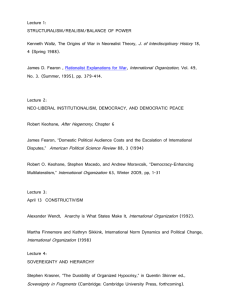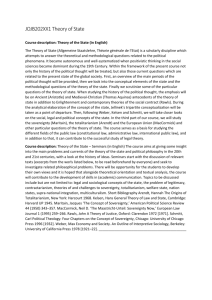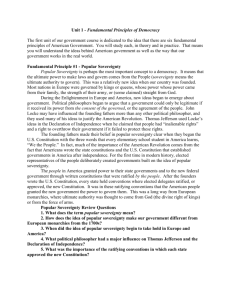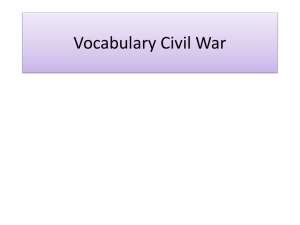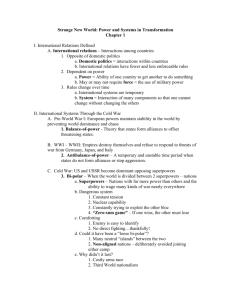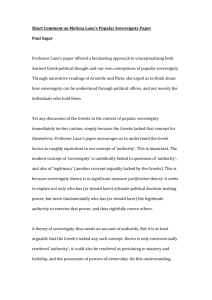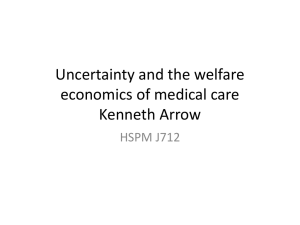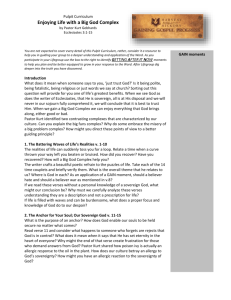Cosmopolitan Sovereignty
advertisement
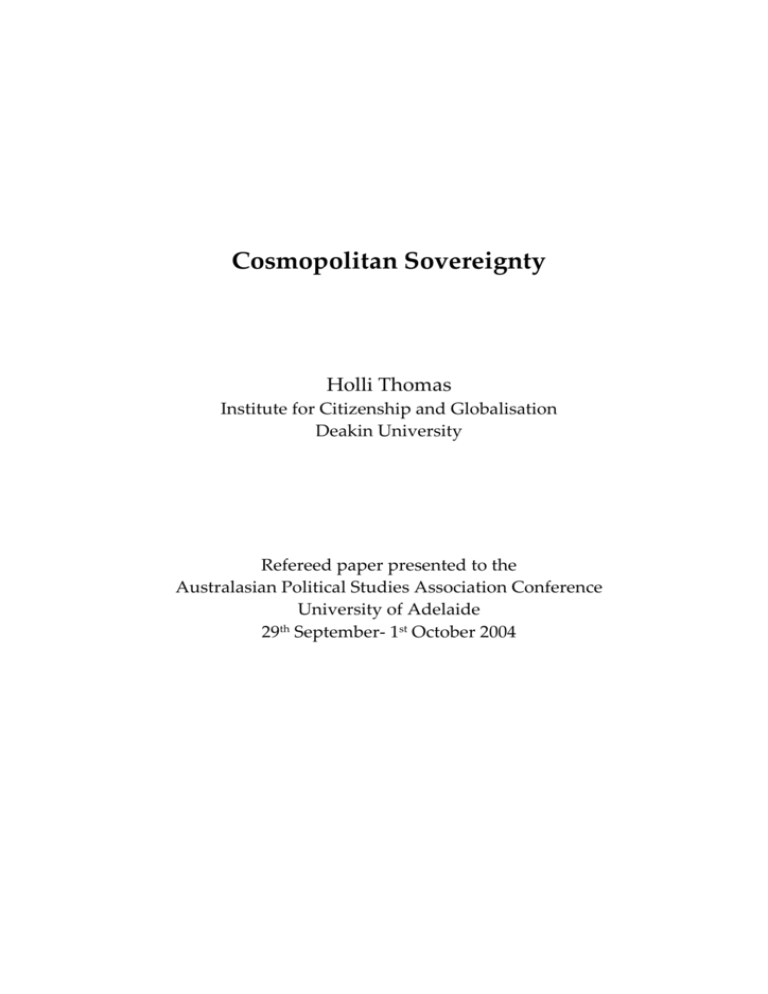
Cosmopolitan Sovereignty Holli Thomas Institute for Citizenship and Globalisation Deakin University Refereed paper presented to the Australasian Political Studies Association Conference University of Adelaide 29th September- 1st October 2004 Holli Thomas: Cosmopolitan Sovereignty Abstract This paper argues that globalisation and the growing political interconnectedness between states and peoples, as well as the near universal acceptance of human rights norms has produced a critical need for the principle of sovereignty to be rethought and redefined. The idea of sovereignty as absolute authority has never in practice existed. Sovereignty, as a legal principle and a normative claim, is shaped and redefined by the changing circumstances and international environment in which it exists. I argue that given the extent to which human rights norms have become entrenched within international law, sovereignty should be reinterpreted as being conditional upon states acting responsibly to ensure the human rights and well-being of their citizens. Furthermore, given that in reality, decisions are made at levels above and below the state, sovereignty, and the legitimate right to rule should be dispersed to those levels. This would result in a kind of ‘cosmopolitan sovereignty’. Such a redefinition of sovereignty can be understood as cosmopolitan in its linking of a legitimate right to rule to the respect of human rights and the provision of human capabilities. It is also cosmopolitan through the detachment of the principle of sovereignty from the bounded territory of the state. 2 Holli Thomas: Cosmopolitan Sovereignty Introduction The principle of state sovereignty is the foundation upon which international relations, the modern interstate system, and international law have been built.1 Since the Treaty of Westphalia it has remained the primary and overriding principle upon which the organisation of the modern world has been based.2 The principle of sovereignty has defined contemporary understandings of world order and justice.3 It is because it has served as such a fundamental principle upon which the modern world is organised that recent questioning of state sovereignty, as both a legal principle and a normative claim, has caused such controversy within academic debates and foreign policy.4 Sovereignty is now a highly contested and intensely debated term, largely as a result of changes in the international realm and their perceived impact upon the sovereignty of states. Sorensen suggests that: [p]rocesses of globalisation making the world hang closer together; humanitarian intervention in weak states and attempts to create democracy and human rights on a global scale; new forms of intense co-operation in Europe and fresh attempts at regional integration elsewhere; the emergence of a large number of newly independent states; all these developments have helped spark new considerations about the possible implications for sovereignty.5 D. Philpott, Revolutions in Sovereignty: How Ideas Shaped Modern International Relations, Princeton University Press, Princeton, 2001, p.16. 1 2 D. Held and A. McGrew, Globalisation/ Anti-Globalisation, Polity Press, Cambridge, 2002, p.11. See also J. Crawford and S. Marks, ‘The Global Democratic Deficit: An Essay in International Law and Its Limits’, in D. Archibugi, D. Held and M. Kohler, Polity Press, Cambridge, 1998. 3 R. Jackson, ‘Sovereignty in World Politics: A Glance at the Conceptual and Historical Landscape’, Political Studies, Vol. 47, p.413. Jackson contends that ‘sovereignty is one of the foremost institutions of our world; it has given political life a distinctive constitutional shape that virtually defines the modern era and sets it apart from previous eras’. 4 J. Barkin and B. Cronin, ‘The State and the Nation: Changing Norms and the Rules of Sovereignty in International Relations’, International Organisation, Vol. 48(1), 1994, pp.107-130. See also J. Camilleri and R. Falk, The End of Sovereignty? The Politics of a Shrinking and Fragmenting World, Edward Elgar, Aldeshot, 1992, p. 11. 5 G. Sorensen, ‘Sovereignty: Change and Continuity in a Fundamental Institution’, Political Studies, Vol. 47, 1999, pp.590-604. 3 Holli Thomas: Cosmopolitan Sovereignty Increasingly it is being suggested that we are moving to a post-sovereign world where legitimate and absolute authority no longer rests in the territorially defined units of states. The question now frequently raised is whether ‘the division of the world’s people into sovereign nations [is] a dominant and unalterable fact of life?’.6 Despite this, or perhaps in response to changes that have seen power extend beyond the state, sovereignty remains a crucial and highly valued principle for most states and today.7 This is because, ‘it is a recognition of their equal worth and dignity, a protection of their unique identities and their national freedom, and an affirmation of their right to shape and determine their own destiny’.8 In a world where there are grave inequalities of both power and resources between states, many states (particularly the weaker) value that under international law all are seen and treated as equally sovereign. State sovereignty, and the principle of non-intervention in the internal affairs of states, offers one of the few protection mechanisms through which states can guard their power and autonomy. However, the reality is that states are not equal, their internal affairs are increasingly shaped by forces beyond the state itself, and the autonomy that states have to determine their own affairs is severely diminished, especially within weaker states. It would appear that there are good 6 P. Singer, One World: The Ethics of Globalisation, The Text Publishing Company, Melbourne, 2002, p.5. S. Hoffmann, ‘Clash of Globalisations’, Foreign Affairs, Vol. 81(4), p.111. Hoffmann remarks, ‘[t]he more state sovereignty crumbles under the blows of globalisation or such recent developments as humanitarian intervention and the fight against terrorism, the more states cling to what is left to them’. 8 Report of the International Commission on Intervention and State Sovereignty, The Responsibility to Protect, December 2001, International Development Research Centre, Canada, p.7. 7 4 Holli Thomas: Cosmopolitan Sovereignty reasons for a redefinition of sovereignty that incorporates and takes into account these changed circumstances. In this paper I argue that sovereignty should be redefined in a manner that links state power and a legitimate right to rule to the protection and provision of human rights and human capabilities for all citizens. Furthermore, given the reality that many decisions are now made at levels above and below the state and the increased number of issues that can only be effectively dealt with at a level beyond the state, there is a need for sovereignty to be dispersed to these levels. Sovereignty would be shared with local, regional and global authorities. This would result in a kind of ‘cosmopolitan sovereignty’ where the prospects of every individual, regardless of what state they may live in, are protected and provided for through a network of overlapping institutions of legitimate governance . The Myth of Absolute Sovereignty The development of the principle of sovereignty has occurred over the past four centuries, amidst continued dispute regarding its precise meaning. What has remained constant in the understanding of sovereignty is that it has been continuously linked to and interpreted as final and absolute political authority within a defined territory.9 Philpott contends that the most specific definition of sovereignty 9 F.H. Hinsley, Sovereignty, Cambridge University Press, Cambridge, 1986, p.26. See also D. Philpott, Revolutions in Sovereignty, p.16. J. Ruggie, ‘Territorality and Beyond: Problematising Modernity in International Relations’, International Organisation, Vol. 47 (1), 1993. 5 Holli Thomas: Cosmopolitan Sovereignty gives the understanding of ‘supreme authority within a territory’.10 Such an understanding of sovereignty dates back to Bodin’s comprehensive discussion in 1576 where he defined sovereignty as the ‘the most high, absolute, and perpetual power over the citizens and subjects in a Commonweale……..the greatest power to command’.11 By this he meant that there was no higher earthly authority or legislative power.12 Hence, sovereignty, according to Bodin, ‘is the undivided and untrammelled power to make and enforce the law and, as such, it is the defining characteristic of the state’.13 Both Hobbes and Hegel also defined sovereignty as supreme and absolute power, claiming sovereign rule as free from any limits.14 In the chain of authority, the holder of sovereignty is the highest, the most supreme. As Beitz claims, in these classical conceptions, sovereignty is viewed simply as ‘final political authority’.15 It was not until the Treaty of Westphalia in 1648 that the concept of sovereignty became attached to the territorial state.16 Philpott has contended that the Treaty of Westphalia brought about not just the beginning of the modern state system, but also a ‘revolution in sovereignty’.17 Final and absolute authority was from this point on considered to reside in the territorially defined state, or more specifically the 10 D. Philpott, ‘Ideas and the Revolution of Sovereignty’, in S. Hashmi, (ed.), State Sovereignty: Change and Persistence in International Relations, Pennsylvania University Press, Pennsylvania, 1997, p.19. 11 J. Bodin, Six Books of a Commenweal, [London, 1606], trans. R. Knolles, K. MacRae and K. Cambridge, Harvard University Press, London, 1962, p.84. 12 J. Camilleri, ‘Rethinking Sovereignty in a Shrinking and Fragmenting World’, in Contending Sovereignties, Lynne Reiner, Boulder, 1990, p.16. 13 D. Held, ‘Law of States, Law of Peoples: Three Models of Sovereignty’, Legal Theory, Vol. 8, 2002, p.3. 14 R. Lapidoth, ‘Sovereignty in Transition’, Journal of International Affairs, Vol. 45 (2), 1992, p.326. See also R. Falk, On Humane Governance: Towards a New Global Politics, Polity Press, Cambridge, 1995, p.88. 15 C. Beitz, ‘Sovereignty and Morality in International Affairs’, in D. Held (ed.), Political Theory Today, Polity Press, Cambridge, 1991, p.238. 16 R. Jackson, pp.438-441. 17 D. Philpott, Revolutions in Sovereignty, Chapters 5 and 6. See also D. Philpott, ‘Westphalia, Authority and International Society’, pp.579-582. 6 Holli Thomas: Cosmopolitan Sovereignty ruler of the state. No longer could Empire or religion rule, both were now forced to respect the sovereign state and refrain from interference in its internal affairs. Thus, the most important result of The Treaty of Westphalia was that sovereignty became linked to territory, it gave ‘a system of political authority based on territory and autonomy’.18 There was believed to be a congruency between sovereignty, territoriality and political community (Falk 1992, 61-78).19 What also emerged from the Treaty of Westphalia was the notion of equal sovereignty, all states were recognised as equally sovereign, and all states acknowledged the sovereignty of other states. This entailed the recognition of both the territorial integrity of states and the right of states to manage their domestic affairs without outside interference.20 Under the Westphalian system, sovereignty was based on ‘the exclusion of external actors from authority structures within a given territory’.21 This later developed into the principle of non-intervention in the internal affairs of states, a principle now enshrined in Article 2-7 of the United Nations Charter.22 It has been suggested that the French Revolution and the ideas of Locke moderated the Westphalian conception of sovereignty, ‘conceiving of government as held in trust for the people, deriving its legitimacy from their consent’.23 While the Treaty of Westphalia gave the principle that sovereignty lay in the state and its ruler, 18 S. Krasner, Sovereignty: Organised Hypocrisy, Princeton University Press, Princeton, 1999, p.20. See also S. Krasner, ‘Compromising Westphalia’, International Security, Vol. 20 (3), 1995/96, p.115. 19 R. Falk, ‘Evasions of Sovereignty’, in R.B.J Walker and S. Mendlovitz, (eds.), Contending Sovereignties: Redefining Political Community, Lynne Reiner, Boulder, 1992, pp.61-78. 20 J. Mayall, ‘Sovereignty, Nationalism and Self-Determination’, Political Theory, Vol. 47, 1999, p.475. 21 S. Krasner, Sovereignty: Organised Hypocrisy, p.4. 22 S Krasner, Sovereignty: Organised Hypocrisy, pp.20-22. 23 J. Camilleri, ‘Rethinking Sovereignty’, p.17. 7 Holli Thomas: Cosmopolitan Sovereignty from the French Revolution in 1789 arose the idea that sovereignty lay in the people. Locke claimed that consent of the people was required to legitimate rule, and that in return, government guaranteed the protection of individual rights. Failure to protect such rights forfeited legitimate authority and sovereign rule. However, within the modern state system, the principle of popular sovereignty has continually been subordinated to claims of state sovereignty.24 As Jackson asserts, ‘current practice is to vest sovereignty in a bordered territorial homeland rather than a distinctive people or nation’.25 Even the UN Charter, established with the intention of strengthening human rights, has until recently defined sovereignty in terms of absoluteness and inviolability.26 The result is that a state may lack internal legitimacy, but still claim external sovereignty and non-interference in its domestic affairs.27 As Krasner remarks ‘[a] state with very limited effective domestic control could still have complete international legal sovereignty’.28 While sovereignty has continuously been defined as absolute authority within a given territory, in actuality, it has never existed in this form.29 It is an empirical reality that ‘[t]here has never been some golden age of the Westphalian state’.30 Krasner claims that very few states have ever possessed all the key properties associated with sovereignty: territory, recognition, exclusive authority, autonomy and 24 B. Barry, ‘Statism and Nationalism: A Cosmopolitan Critique’, in S. Shapiro and L.Brilmayer, (eds.), Global Justice, New York University Press, New York, 1999. See also R. Falk, ‘Evasions of Sovereignty’, p.63. 25 R. Jackson, p. 466. 26 M. Ignatieff, ‘Intervention and State Failure’, Dissent, 2002, pp.115-123. See also P. Taylor, ‘The United Nations in The 1990s: Proactive Cosmopolitanism and the Issue of Sovereignty’, Political Studies, Vol. 47, 1999, p.538. 27 D. Luban, ‘Just War and Human Rights’, Philosophy and Public Affairs, Vol. 9, 1980, pp.160-181. 28 S. Krasner, Sovereignty: Organsied Hypocrisy, p.12. 29 S. Krasner, ‘Think Again: Sovereignty’, Foreign Policy, 2001, winter. 30 S. Krasner, ‘Compromising Westphalia’, p.115. 8 Holli Thomas: Cosmopolitan Sovereignty control.31 Rather, he asserts that the norms associated with sovereignty have been violated or discarded by the more powerful states as they chose. Throughout the history of the Westphalian state system, sovereignty has been compromised through conventions, contracting, coercion and imposition. As Krasner claims: Rulers can join international conventions in which they agree to abide by certain standards regardless of what others do. Rulers can enter into contracts in which they agree to specific policies in return for explicit benefits. Rulers can be subject to coercion, which leaves them worse off, although they do have some bargaining leverage. Finally, rulers or would be rulers can suffer imposition, a situation that occurs when the target ruler cannot effectively resist.32 As a result Krasner describes sovereignty as merely organised hypocrisy where the rulers of powerful states have determined the rules of sovereignty and violated them depending on their power and interest. Krasner’s empirical research demonstrates that in almost all cases when the sovereignty of more powerful states has been compromised, it has been a result of voluntary decisions (to enter into contracts or conventions). It is only the weaker states whose sovereignty has been violated by coercion or imposition.33 Krasner also demonstrates that it is not just in recent times that sovereignty has been compromised, rather this has occurred throughout the history of the Westphalian state system. For example, when Greece was recognised as an independent state in 1832, it was forced to accept a sixty-thousand-franc loan and the presence of foreign officials, chosen and determined by the major powers of Europe. Furthermore, the form of government, ministers, army officers and economic 31 S. Krasner, Sovereignty: Organised Hypocrisy, p.220. S. Krasner, Sovereignty: Organised Hypocrisy, p.26. 33 S. Krasner, Sovereignty: Organised Hypocrisy, pp.28-29. 32 9 Holli Thomas: Cosmopolitan Sovereignty policies were all determined by the major European states.34 This is a situation not too different to current impositions the IMF place on states requiring loans. In both cases there is a clear violation of sovereignty, diminishing the supposed absolute authority of the state.35 Hence it can be seen that the state has never been an institution wielding absolute authority and control.36 While the state has clearly suffered a loss of sovereignty in the face of globalisation, it is not as though there was ever a time when the state held a position of absolute power and authority. As Krasner suggests: I do not want to claim that globalisation has had no impact on state control, but these challenges are not new. Rulers have always operated in a transnational environment; autarky has rarely been an option; regulation and monitoring of transborder flows have always been problematic. The difficulties for states have become more acute in some areas, but less in others.37 The myth of absolute sovereignty is also a result of the widely held belief that sovereignty is a static and fixed concept.38 However, sovereignty, as Hinsely claims, is not a fact.39 Sovereignty is a legal principle and a normative claim. As a juridical concept or legal principle, sovereignty refers to legitimate authority and the absence of higher authority. However, like all legal principles sovereignty does not exist in a vacuum, it must be interpreted within the international environment in which it exists, as a result, the meaning of sovereignty changes over time. For instance, the dramatic growth in forms of authority higher than the state has profoundly influenced 34 S. Krasner, Sovereignty: Organised Hypocrisy, pp.34-39. R .Falk, On Humane Governance, p. 98. 36 B. Holton, Globalisation and the Nation-State, MacMillan Press, London, 1998, pp.83-84. 37 S. Krasner, Sovereignty: Organised Hypocrisy, p.223. 38 J. Barkin and B. Cronin, p.107. 39 F.H. Hinsley, p.1. 35 10 Holli Thomas: Cosmopolitan Sovereignty the international arena in which sovereignty must be interpreted. Consider the EU, the huge growth in international laws especially in the area of human rights, the recent establishment of the International Criminal Court, and other legitimate institutions such as the IMF. Beitz is right to suggest that if sovereignty means the absence of higher authority, ‘then the concept fails to apply to most states in the modern world system’.40 This does not mark the failure of sovereignty, rather it is evidence of how the concept is evolving. It has to be understood that international law, like domestic law, is not static. It is open to interpretation and changes and evolves as the norms of international society also change. For this reason Barkin and Cronin define sovereignty as a variable, they argue that ‘the rules of sovereignty are neither fixed nor constant, but rather are subject to changing interpretations’.41 In the last two decades human rights norms have become entrenched within international law, thus sovereignty has to be interpreted and understood alongside of these emerging human rights norms.42 The result Barkin claims is not the decline of sovereignty, but the evolution of what sovereignty means.43 Until very recently normative claims privileged the state and endorsed the territorial integrity of existing states above any other moral principle.44 However changing circumstances since the end of the Cold War has seen the norms surrounding sovereignty become increasingly influenced by the developing norms 40 C. Beitz, p.241. J. Barkin and B. Cronin, p.107. 42 D. Held, ‘Law of States’, p.17. 43 J. Barkin, ‘The Evolution of the Sovereignty of Sovereignty and the Emergence of Human Rights Norms’, Millennium, 1998, pp.229-252. 44 R. Falk, On Humane Governance, p.99. See also B. Barry. 41 11 Holli Thomas: Cosmopolitan Sovereignty (and legal instruments) of human rights and global social justice, further qualifying any notion of absolute sovereignty. Taylor contends that during the 1990s state sovereignty ‘came to depend upon being recognised as a fit member of international society’, this meant complying with the conditions of international law, acting responsibly to ensure the welling-being of all citizens, and being accountable to higher authorities such as the UN.45 Philpott describes these changes that have taken place since the end of the Cold War as revolutionary as they question the principle of nonintervention.46 For this reason, Philpott suggests that sovereignty is not evolving, but rather is transformed and revised through what he terms ‘revolutions in sovereignty’. He suggests that what we are witnessing now is a movement away from a system of sovereign states, brought about as a result of European integration and the rise of internationally sanctioned intervention.47 Whether undergoing a revolution or merely evolving, the principle of sovereignty is being altered and can no longer be understood as confined to the territorial state or as representing absolute and final political authority. Sovereignty and Responsibility From a cosmopolitan perspective, there is a perceived need for sovereignty to be redefined so that it is dependent and conditional upon states being responsible for 45 P. Taylor, pp.557-563. D. Philpott, ‘Westphalia, Authority and International Society’, p.586. 47 D. Philpott, Revolutions in Sovereignty, p.37. 46 12 Holli Thomas: Cosmopolitan Sovereignty the well-being of their citizens.48 Theories of sovereignty have always been linked to notions of legitimate rule. Principles of moral cosmopolitanism demand that legitimate rule should be interpreted as to require the protection of citizens’ human rights and well-being. Sovereignty and legitimate rule should depend upon governments being accountable to their people. This is not a new idea, in many respects it is a return to the idea of ‘popular sovereignty’ expressed by Locke, that only individual consent can legitimate government. It is to return to the principle that emerged from the French Revolution that sovereignty rests in the people.49 It is also a concept that already holds considerable support within the international arena.50 Indeed, Taylor has suggested that the 1990s saw sovereignty be redefined by a form of ‘proactive cosmopolitanism’.51 In 1999 Kofi Annan, the UN secretary-general, claimed that sovereignty was being redefined so that ‘[s]tates are now widely understood to be the instruments at the service of their peoples, and not vice versa’.52 Annan’s point was to demonstrate that in situations like Rwanda or Somalia where there have been gross and systemic violations of human rights, states should not retain their international legitimacy and be able to call upon the principle of non-intervention. His approach was not that radical, but rather reflected the growing international consensus that the only legitimate form of government was one based on democratic rule, accountability and 48 D. Held, ‘Law of States’, p.23. See also P. Singer, pp.5-6. R. Lapidoth, p.332. 50 M. Kaldor, Global Civil Society: An Answer to War, Polity Press, Cambridge, 2003, pp.4-5. 51 P. Taylor, p.546. 52 K. Annan, ‘Two Concepts of Sovereignty’, The Economist, Vol. 352, issue 137, 1999, p.49. 49 13 Holli Thomas: Cosmopolitan Sovereignty respect for human rights.53 In support of this redefinition of sovereignty the International Commission on Intervention and State Sovereignty (ICISS) was established as a result of collaboration between the UN, the Government of Canada and other major foundations. The report of the ICISS found that, as a basic principle, ‘state sovereignty implies responsibility’.54 In thinking of sovereignty as responsibility it was meant that, ‘state authorities are responsible for the functions of protecting the safety and lives of citizens and promotion of their well-being’.55 Furthermore, it was contended that states were seen as responsible for their actions or inactions that affected their citizens, and that they were accountable to the international community and specifically the UN in respect to this. The report suggested that the foundations for such an understanding of sovereignty came from four sources. Firstly, it was claimed that within the concept of sovereignty itself, there has always existed an implied duty of states ‘to respect the dignity and basic rights of all the people within the state’.56 Secondly, the understanding of sovereignty as responsibility was found in the duty of the Security Council under Article 24 of the UN Charter to maintain international peace and security.57 It is argued that this places a duty upon the Security Council to act to protect and prevent gross human suffering where the state is clearly failing to do so. Thirdly sovereignty can be interpreted as 53 L. Freivalds and J. Straw, ‘A Global Order Based on Justice’, International Herald Tribune, 23rd June 2004. Here the foreign minister of Swede and the foreign secretary of Britain assert that ‘we recognise that sovereignty also implies a responsibility of states towards their populations and toward each other. When states manifestly fail to meet that responsibility, as in the Balkans in the 1990s, the international community may have to act’. 54 Report of the International Commission on Intervention and State Sovereignty, p.xi. 55 Report of the International Commission on Intervention and State Sovereignty, p.13. 56 Report of the International Commission on Intervention and State Sovereignty, p.8. 57 Report of the International Commission on Intervention and State Sovereignty, p.47. 14 Holli Thomas: Cosmopolitan Sovereignty responsibility through the specific human rights laws, covenants, treaties and declarations. The Universal Declaration of the Human Rights and the two Covenants have established a benchmark for state conduct.58 Furthermore state conduct has become increasingly judged and monitored by the vast array of international organisations, NGOs and civil society activists. What is also being actualised is the enforcement of human rights law through the specific international criminal tribunals which have been established, and now with the Rome Statute establishing the International Criminal Court. Indeed, as the Commission reports, ‘[w]hat has been gradually emerging is a parallel transition from a culture of sovereign impunity to a culture of national and international accountability’.59 Finally the emerging practice of states, regional organisations, the UN and the international community at large demonstrate an understanding of sovereignty that implies responsibility. Hence the argument is that sovereignty is being reframed, ‘[s]overeignty as responsibility has become the minimum content of good international citizenship. Although this new principle cannot be said to be customary international law yet, it is sufficiently accepted in practice to be regarded as a de facto emerging norm: the responsibility to protect’.60 This paper supports the interpretation of sovereignty as implying responsibility and argues that sovereignty should be viewed as dependent and conditional upon states protecting the well-being, dignity and human rights of its 58 J. Barkin, p.229. Report of the International Commission on Intervention and State Sovereignty, 14. 60 G. Evans and M. Sahoun, ‘The Responsibility to Protect’, Foreign Affairs, Vol. 81(6), 2002, pp.246-248. 59 15 Holli Thomas: Cosmopolitan Sovereignty citizens.61 Indeed, the argument of sovereignty as requiring responsibility is taken a step further. It is asserted that for a state to be considered responsible, its social and political institutions must be structured so as to promote at least the minimum threshold of capability. This links sovereignty to Nussbaum’s list of capabilities and makes state sovereignty dependent and conditional not just upon the protection of civil and political rights, but upon states meeting the minimum threshold of capability for all citizens. Nussbaum’s human capability approach questions what a bare minimum of respect for human dignity requires through asking ‘which things are so important that we will not consider a life as human without them?’.62 Nussbaum asserts that there are certain things from the world that a human life requires to be capable of functioning as a human being. From posing this question Nussbaum has developed over the years a list of what she considers to be the most central human capabilities including nutrition, education, protection of bodily integrity, freedom of speech and religious expression etc… Thus the means for judging the legitimacy of a state does not just depend upon the provision of human rights, but the capability of individuals to function as fully formed human beings.63 From this perspective, sovereignty is not understood as ‘absolute’ authority. Neither is sovereignty a right all states automatically hold. Rather, the state is only seen as having a legitimate right to govern 61 J. Barkin, pp.246-248. M. Nussbaum, ‘Human Functioning and Social Justice: In Defence of Aristotelian Essentialism’, Political Theory, 1992, Vol. 20, p.208. 63 M. Nussbaum, ‘Justice for the Excluded of the World: Capabilities Across National Boundaries’, Tanner Lecture in Human Values, Australian National University, Canberra, 2002, p.74. 62 16 Holli Thomas: Cosmopolitan Sovereignty when it adequately provides for the capabilities of all citizens.64 It is argued that ‘the proper role of government is to bring all citizens up to a certain basic minimum level of capability’.65 This is a very demanding interpretation of the role of the state. It requires affirmative material and institutional support from the social and political institutions of the state to ensure the capability of individuals, not simply a failure to impede on the rights of individual.66 The reason for this, as Nussbaum argues, is that without a minimum threshold of capability, an individual cannot be considered a fully formed human being. Thus the state can be considered to have failed its most basic responsibility. The result, as Held asserts is that: [s]overeignty can no longer be understood in terms of the categories of untrammelled effective power. Rather, a legitimate state must increasingly be understood through the language of democracy and human rights. Legitimate authority has become linked, in moral and legal terms, with the maintenance of human rights values and democratic standards. The latter set a limit on the range of acceptable diversity among the political constitutions of states.67 Sovereignty Dispersed and Diluted The impact globalisation is having on the ability of the state to govern has in recent years sparked considerable debate regarding the extent to which the state remains the key actor in international relations. States have not withered away and remain important actors, however they are now enmeshed in a complex global and 64 M. Nussbaum, ‘Aristotelian Social Democracy’, in B. Douglas (ed.), Liberalism and the Good, Routledge, London, 1990. 65 M. Nussbaum, ‘Capabilities and Human Rights’, in P. DeGrieff and C. Cronin, (eds.), Global Justice and Transnational Politics: Essays on the Moral and Political Challenges to Globalisation, MIT Press, Massachusetts, 2002, p.122. 66 M. Nussbaum, ‘Justice for the Excluded of the World’, p.62. 67 D. Held, ‘Law of States’, p.17. 17 Holli Thomas: Cosmopolitan Sovereignty regional web of interconnections.68 This growing political interconnectedness is seen to exist in all fields- political, military, economic and cultural, reducing the ability of the state to make and enforce rules and fundamentally changing the nature of the state.69 The impact of globalisation may be contested, but what has become undeniably evident is that globalisation has affected the capacity of the state to contribute to human well-being. Accordingly, ‘individual states on their own can no longer be conceived as the appropriate political units for either resolving key political problems or managing effectively a broad range of public functions’.70 This does not mean doing away with states. Rather the argument made here is that if states alone are increasingly unable to fulfil the role required of political institutions to provide for individual well-being then this necessitates the development of other institutional arrangements and requires that the principle of sovereignty be detached from the territorial state. It is suggested that there are no longer valid reasons for sovereignty to be contained within the territorial limits of the state. Given that legitimate authority to make decisions, and in effect, the governance of individuals, often comes from sources outside of the state, there would seem to be no reason to concentrate sovereignty within the territorial boundaries of the state.71 Sovereignty is really a claim to how power and authority should be exercised, there is nothing to suggest that this must 68 R. Falk, Predatory Globalisation: A Critique, Polity Press, Cambridge, 1999, p.39. M. Kaldor, Global Civil Society, p.112. 70 D. Held and A. McGrew, p.32. 71 D. Held, ‘Changing Contours of Political Community’, in B. Holden, (ed.), Global Democracy, Routledge, London, 2001, p.26. 69 18 Holli Thomas: Cosmopolitan Sovereignty occur within the state. As Held has suggested, ‘[h]istorically, the idea of sovereignty offered a new way of thinking about an old problem: the nature of power and rule….The theory of sovereignty became a theory of the rightful use of power’.72 If political issues as well as political communities stretch across state borders, then there would seem to be valid reasons as to why sovereignty, or legitimate rule, should be dispersed to reflect this. Furthermore, if the state alone can not ensure the well-being of the individual, then sovereign authority should be dispersed to institutions above and below the state that can better serve the needs of both individuals and community. Pogge asserts that: Dispersing political authority over nested territorial units would decrease the intensity of the struggle for power and wealth within and among states, thereby reducing the incidence of war, poverty and oppression. In such a multi-layered scheme, borders could be redrawn more easily to accord with the aspirations of peoples and communities.73 Today political power and authority is increasingly being divided and dispersed above and below the state, resulting in overlapping and interconnecting structures of power, authority and governance. Legal and institutional understandings of sovereignty should be altered to reflect this reality. This requires a radical shift in traditional thinking within international relations and in the traditional place of the state within international law. In both circumstances the state has been viewed as the primary and sole legitimate centre of authority. However such an 72 D. Held, ‘Democracy, The Nation-State and the Global System’, Economy and Society, Vol. 20(2), 1991, p.161. T. Pogge, ‘Cosmopolitanism and Sovereignty’, in C. Brown, (ed.), Political Restructuring in Europe: Ethical Perspectives, Routledge, London, 1994, p.89. 73 19 Holli Thomas: Cosmopolitan Sovereignty understanding of sovereignty need not be seen as radical when the realities of political authority within the contemporary world are considered. As Held claims, political power ‘has been diffused below, above and alongside the nation-state’.74 All that is being suggested is that the principle of sovereignty should be redefined so that it actually reflects legitimate forms of governance. To claim that the state today is the highest and final point of authority simply is not true. As Falk has asserted ‘the insistence on locating sovereignty exclusively in the governing institutions of territorial states is a pompous and dangerous pretension’.75 Furthermore the perpetuation of this false understanding of sovereignty is preventing other institutions from acting to prevent the abuse of human rights or from improving the welfare and well-being of individuals. By privileging sovereign equality amongst states that are not equal and maintaining a principle of non-intervention towards states that are gross abusers of human rights, all that is being ensured, is that a great deal of the worlds population remain trapped in poverty, oppression and misery. Sovereignty anchored in the state, acts to provide ‘a subtle camouflage that obscures the actuality of inequality and exploitative relations, as well as the violent epicentre of geopolitics’.76 Given that cosmopolitanism is concerned with the prospects of every individual regardless of what state they may live within, maintaining a notion of absolute sovereignty is viewed as intolerable. Instead there needs to be a strengthening of institutions above and below the state that are capable of tackling 74 D. Held, ‘Globalisation: Cosmopolitanism Tamed’, Review of International Studies, Vol. 29, 2003, p.478. R. Falk, On Humane Governance, p.98. 76 R. Falk, On Humane Governance, p.80. 75 20 Holli Thomas: Cosmopolitan Sovereignty huge issues such as global poverty and global environmental issues such as global warming. To an extent this is already happening with the formation of the EU and the ICC producing what Waldron has referred to as the ‘circumstances of cosmopolitanism’.77 Dispersing sovereignty in this manner may allow for inequalities to be better recognised and responded to. It shifts responsibility for the well-being of citizens from the state alone and allows other institutions to perform some traditional state functions where the state itself is incapable of doing so. Such a multi-layered scheme of governance also has the advantage of ‘affording plenty of checks and balances and of assuring that, even when some political units turn tyrannical and oppressive, there will always be other, already fully organised political units (above, below, or on the same level) which can render aid and protection to the oppressed, publicise the abusers, and, if necessary, fight the oppressors’.78 Sovereignty dispersed in this manner could give local institutions authority over local decisions and global institutions authority over global concerns, jurisdiction would be determined by the nature of issues and as a result no authority would claim absolute sovereignty. Sovereignty would be shared with local, regional and global authorities, producing what Bull termed ‘overlapping sovereignties’.79 The emphasis on the political entitlements and well-being of all individuals within each of these political structures is the essence of what Held refers to as ‘cosmopolitan sovereignty’. He asserts that: Cosmopolitan sovereignty comprises networked realms of public authority shaped and delimited by cosmopolitan law. 77 J. Waldron, p.23. T. Pogge, p.104. 79 H. Bull, ‘The State’s Positive Role in World Affairs’, Daedalus, 1979, Vol. 108, p.114. 78 21 Holli Thomas: Cosmopolitan Sovereignty Cosmopolitan sovereignty is sovereignty stripped away from the idea of fixed borders and territories governed by states alone, and is instead thought of as frameworks of political regulatory relations and activities, shaped and formed by an overarching cosmopolitan legal framework.80 Increasingly governance and political organisation appears to be developing into more of a multi-layered scheme.81 What is hampering the effectiveness of these institutions is the right to absolute sovereignty and authority that states continue to claim. Consider attempts to govern specific issues such as the environment or human rights at a global level. If international organisations such as the UN were strengthened and given legitimate authority and jurisdiction to enforce the governance of global issues such as the environment, then policy implementation would be far more effective. For such institutions to have teeth and backbone, it is necessary that sovereignty, and the legitimate right to enforce rules and regulations be dispersed above and below the state. This is effectively what is beginning to occur within the EU with the ‘pooling of sovereignty’. While states retain control over many domestic issues, concerns common to the EU can now be tackled far more effectively at this regional level. For instance, presently France retains sovereign authority with respect to defence policy, but trade issues are determined jointly within the EU.82 The benefits to member states of the EU are already becoming evident, with other states within Europe now going to great lengths in the hope of achieving membership. It is 80 D. Held, ‘Law of States’, p.33. A. Wendt, ‘Collective Identity Formation and the International State’, American Political Science Review, Vol. 88(2), pp.384-396. 82 D. Philpott, Revolutions in Sovereignty, p.19. 81 22 Holli Thomas: Cosmopolitan Sovereignty interesting that in pooling sovereignty, many states in Europe have actually gained power, a result of being part of an influential collective. It is also interesting that what is being fostered within the EU is an environment of cooperation, negotiation and reconciliation where the rule of law and especially international law has a central role. Pogge suggests that if sovereignty were dispersed in a similar manner across the globe there would be a significant decrease in conflict.83 The problem is that states go to great lengths to protect what remains of their sovereign power, while groups that do not have their own state are prepared to go to great lengths to protect that status. If power and legitimate authority were to be dispersed across local, regional and global levels, then the status of statehood and either the protecting or obtaining of it would not hold the same interest and appeal. The state becomes just one of several institutions that govern individuals and within which individuals can actively participate. Memberships are therefore broadened and become more inclusive, but at the same time ethnic, cultural or national groups can have autonomy over their own affairs without requiring an independent state. As Pogge asserts: [w]ar and oppression result from the contest for power within and among political units, which tends to be more intense the higher the stakes. In fights to govern states, or to redraw their borders, far too much is now at stake by way of control of people and resources. We can best lower the stakes by dispersing political authority over several levels.84 83 84 T. Pogge, p.103. T. Pogge, p.104. 23 Holli Thomas: Cosmopolitan Sovereignty It is for these reasons that Gow contends that international peace and security depends upon the strengthening of institutions above and below the state. Sovereignty, he argues, needs to be shared internally, between different communities within states and internationally, with the surrender of portions of sovereignty to international bodies.85 Conclusion This paper asserts the need for a fundamental rethinking of the principle of sovereignty. I have argued that the connection between sovereignty and responsibility requires that sovereignty be viewed as conditional upon states protecting the human rights and human capabilities of its citizens. In this paper I have asserted that the dispersing of sovereignty allows for individual freedom and well-being to be more effectively provided for and safeguarded. The myth of absolute sovereignty needs to be replaced with an understanding of sovereignty that is both conditional and dispersed. This requires that, ‘[s]overeignty can be stripped away from the idea of fixed borders and territories and rethought of as, in principle, an attribute of basic cosmopolitan democratic law which can be drawn upon and enacted in diverse realms, from local associations and cities to states and wider global networks’ (Held 2002, 32). States themselves are unlikely to voluntarily relinquish any of their proclaimed sovereign power. However, the move to a cosmopolitan understanding of 85 P. Gow, ‘Shared Sovereignty, Enhanced Security: Lessons From the Yugoslav War’, in S. Hasmi (ed.), State Sovereignty: Change and Persistence in International Relations, Pennsylvania State University Press, Pennsylvania, 1997. 24 Holli Thomas: Cosmopolitan Sovereignty sovereignty is already emerging through state practice and the increasing willingness of the international community to intervene in the internal affairs of states for humanitarian purposes. This links sovereignty to responsibility. Furthermore, power is being centralised and devolved within the global system resulting in the evolution of sovereignty, regardless of how states try to protect their remaining power. The emergence of global civil society can also be understood as a force that is acting to hold states accountable to their people and ensure states act in accordance with human rights laws and norms. This is facilitating the development of a cosmopolitan understanding of sovereignty. 25 Holli Thomas: Cosmopolitan Sovereignty Bibliography Annan, K. 1999. ‘Two Concepts of Sovereignty.’ The Economist 352(137): 49. Barkin, J.S. 1998. ‘The Evolution of the Constitution of Sovereignty and the Emergence of Human Rights Norms.’ Millenium 27(2):229-252. Barkin, J.S. and Cronin, B. 1994. ‘The State and The Nation: Changing Norms and the Rules of Sovereignty in International Relations.’ International Organisation 48(1): 107-130. Barry, B. 1999. ‘Statism and Nationalism: A Cosmopolitan Critique.’ In Global Justice, eds. Shapiro, L. and Brilmayer, L. New York: New York University Press. Beitz, C. 1991. ‘Sovereignty and Morality in International Affairs.’ In Political Theory Today, ed. Held, D. Cambridge: Polity Press. Biersteker, T. and Weber, C. 1996. State Sovereignty as Social Construct. Cambridge: Cambridge University Press. Bodin, J. 1962. six Books of a Commonweal [London, 1606]. Trans. Knolles, R. and MacRae, K. Cambridge: Harvard University Press. Bull, H. 1979. ‘The State’s Positive Role in World Affaris.’ Daedalus 108:111-123. Camilleri, J. 1990. ‘Rethinking Sovereignty In A Shrinking and Fragmenting World.’ In Contending Sovereignties: Rethinking Political Community. Boulder: Lynne Rienner. Camilleri, J. and Falk, R. 1992. The End of Sovereignty? The Politics of a Shrinking and Fragmenting World. Aldeshot: Edward Elgar. Crawford, J and Marks, S. 1998. ‘The Global Democratic Deficit: An Essay In International Law and Its Limits’. In Reimagining Political Community: Studies in Cosmopolitan Democracy, eds. Archibugi, D., Held, D. and Kohler, M. Cambridge: Polity Press. Evans, G. and Sahoun, M. 2002. ‘The Responsibility to Protect.’ Foreign Affairs 81(6): 99-111. Falk, R. 1999. Predatory Globalisation: A Critique. Cambridge: Polity Press. Falk, R. 1995. On Humane Governance: Towards a New Global Politics. Cambridge: Polity Press. Falk, R. 1992. ‘Evasions of Sovereignty.’ In Contending Sovereignties: Redefining Political Community, eds. Walker, R.B.J. and Mendlovitz, S. Colorado: Lynne Reinner Publishers. Freivalds, L. and Straw, J. 2004. ‘A Global Order Based on Justice.’ International Herald Tribune 23rd June. Gow, P. 1997. ‘Shared Sovereignty, Enhanced Security: Lessons From the Yugoslav War.’ In State Sovereignty: Change and Persistence in International Relations ed. Hasmi, S. Pennsylvania: Pennsylvania State University Press. Held, 1991. ‘Democracy, the Nation-State and the Global System.’ Economy and Society 20(2): 138-172. Held, D. 2001. ‘Changing Contours of Political Community.’ In Global Democracy, ed. Holden, B. London: Routledge. Held, D. 2002. ‘Law of States, Law of Peoples: Three Models of Sovereignty.’ Legal Theory 8:1-44. Held, D. 2003. ‘Globalisation: Cosmopolitanism Tamed.’ Review of International Studies 29:465-480. Held, D. and McGrew, A. 2002. Globalisation/ Anti-Globalisation. Cambridge: Polity Press. 26 Holli Thomas: Cosmopolitan Sovereignty Hinsley, F.H. 1986 [2nd ed.]. Sovereignty. Cambridge: Cambridge University Press. Hoffmann, S. 2002. ‘The Clash of Globalisations.’ Foreign Affairs 81(4): 104-115. Holton, B. 1998. Globalisation and the Nation-State. London: MacMillan Press. Ignatieff, M. 2002. ‘Intervention and State Failure.’, Dissent Winter:115-123. Jackson, R. 1999. ‘Sovereignty in World Politics: A Glance at the Conceptual and Historical Landscape.’ Political Studies 47:423-456. Kaldor, M. 2003. ‘American Power: From ‘Compellance’ to ‘Cosmopolitanism’.’ International Affairs 79(1): 136-175. Kaldor, M. 2003. Global Civil Society: An Answer to War. Cambridge: Polity Press. Krasner, S. 1995/96. ‘Compromising Westphalia.’ International Security 20(3): 115-151. Krasner, S. 1999. Sovereignty: Organised Hypocrisy. Princeton: Princeton University Press. Krasner, S. 2001. ‘Think Again: Sovereignty.’ Foreign Policy Winter. Lapidoth, R. 1992. ‘Sovereignty in Transition.’ Journal of International Affairs 45(2): 325-345. Luban, D. 1980. ‘Just War and Human Rights.’ Philosophy and Public Affairs 9:160-181. Mayall, J. 1999. ‘Sovereignty, Nationalism and Self-Determination.’ Political Studies 47:474-502. Nussbaum, M. 2002. ‘Justice for the Excluded of the World: Capabilities Across National Boundaries.’ Tanner Lecture in Human Values. Australian National University, Canberra. Nussbaum, M. 1992. ‘Human Functioning and Social Justice: In Defence of Aristotelian Essentialism.’ Political Theory 20:202-246. Nussbaum, M. 2002. ‘Capabilities and Human Rights.’ In Global Justice and Transnational Politics: Essays on the Moral and Political Challenges to Globalisation eds. DeGreiff, P. and Cronin, C. Massachusetts: MIT Press. Nussbaum, M. 1990. ‘Aristotelian Social Democracy.’ In Liberalism and the Good ed. Douglas, B. London: Routledge. Philpott, D. 1997. ‘Ideas and the Evolution of Sovereignty.’ In State Sovereignty: Change and Persistence in International Relations, ed. Hashmi, S. Pennsylvania: Pennsylvania State University Press. Philpott, D. 1999. ‘Westphalia, Authority and International Society.’ Political Studies 47:566-589. Philpott, D. 2001. Revolutions in Sovereignty: How Ideas Shaped Modern International Relations. Princeton: Princeton University Press Pogge, T. 1994. ‘Cosmopolitanism and Sovereignty.’ In Political Restructuring In Europe: Ethical Perspectives. London: Routledge. Report of the International Commission on Intervention and State Sovereignty. 2001. The Responsibility to Protect. Ruggie, J. 1993. ‘Territorality and Beyond: Problematising Modernity in International Relations.’ International Organisation 47(1). Singer, P. 2002. One World: The Ethics of Globalisation. Melbourne: The Text Publishing Company. 27 Holli Thomas: Cosmopolitan Sovereignty Sorensen, G. 1999. ‘Sovereignty: Change and Continuity in a Fundamental Institution.’ Political Studies 47:590-604. Taylor, P. 1999. ‘The United Nations in the 1990s: Proactive Cosmopolitanism and the Issue of Sovereignty.’ 47:538565. Wendt, A. 1994. ’Collective Identity Formation and the International State.’ American Political Science Review 88(2): 384-96. 28

